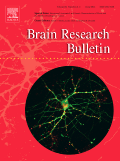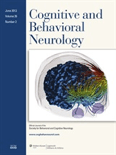
Zeitschrift fur Neuropsychologie
Scope & Guideline
Advancing the Frontiers of Neuropsychological Research
Introduction
Aims and Scopes
- Neuropsychological Assessment:
Focuses on the development and validation of assessment tools and methodologies used to evaluate cognitive functions in various populations, including those with neurological disorders. - Rehabilitation Techniques:
Covers innovative therapeutic interventions and rehabilitation strategies tailored for individuals with cognitive impairments, particularly following brain injuries or neurological diseases. - Impact of Neurological Conditions:
Explores the neuropsychological implications of various neurological diseases, including dementia, traumatic brain injuries, and the effects of COVID-19 on cognitive function. - Interdisciplinary Approaches:
Encourages collaboration across disciplines to enhance understanding and treatment of neuropsychological disorders, integrating insights from psychology, neurology, and rehabilitation sciences. - Emerging Technologies in Therapy:
Investigates the role of technology in neuropsychological interventions, including AI-based solutions and telepresence systems for enhancing therapy and assessment.
Trending and Emerging
- Post-COVID-19 Neuropsychology:
A surge in publications addressing the cognitive and psychological effects of COVID-19 has emerged, reflecting the pandemic's impact on mental health and neuropsychological rehabilitation. - AI and Technology in Neuropsychology:
Increasing interest in the application of artificial intelligence and technology-based solutions for neuropsychological assessment and therapy, indicating a trend towards integrating modern tools in clinical practice. - Holistic and Interdisciplinary Approaches:
Emerging research emphasizes the need for holistic treatment methods that consider various factors affecting cognitive health, fostering collaboration across disciplines to improve patient outcomes. - Neurorehabilitation Innovations:
A growing focus on innovative rehabilitation techniques, including neuromodulation and individualized therapy plans, signifies a trend towards enhancing therapeutic effectiveness for cognitive disorders. - Social Cognition and Communication Disorders:
An increased emphasis on understanding social cognition and its implications for communication disorders, particularly in the context of traumatic brain injury, has gained traction in recent publications.
Declining or Waning
- Neuropsychology of Psychiatric Disorders:
Although still relevant, there has been a noticeable reduction in publications specifically addressing the neuropsychological aspects of psychiatric disorders compared to previous years. - Standardized Testing Protocols:
The prominence of papers solely focused on traditional standardized testing methods has waned, possibly due to a growing emphasis on individualized and dynamic assessment approaches. - Cognitive Impairment in Specific Populations:
Research focusing on specific demographics, such as the elderly or specific clinical populations, has decreased, potentially indicating a shift towards broader, more integrative studies. - Longitudinal Studies:
Fewer longitudinal studies investigating the progression of cognitive impairments over time have been published, suggesting a shift towards more immediate clinical applications and interventions.
Similar Journals

NEUROPSYCHOLOGICAL REHABILITATION
Elevating Clinical Practices in NeuropsychologyNEUROPSYCHOLOGICAL REHABILITATION is a prestigious peer-reviewed journal dedicated to the field of neuropsychology and rehabilitation. Published by Routledge Journals, Taylor & Francis Ltd, it stands at the forefront of research and development in applied psychology, arts and humanities, and rehabilitation, boasting an impressive impact factor and a distinguished ranking within various academic categories. With a strong commitment to advancing the science of rehabilitation and cognitive recovery, the journal aims to provide a platform for innovative research, systematic reviews, and clinical findings that inform best practices in the field. As it converges into its third decade of publication—from 1991 to 2024—NEUROPSYCHOLOGICAL REHABILITATION remains essential for researchers, clinicians, and students seeking cutting-edge insights and methodologies to enhance patient care and cognitive rehabilitation strategies.

COGNITIVE NEUROPSYCHOLOGY
Bridging Neuroscience and Psychology for a Deeper UnderstandingCOGNITIVE NEUROPSYCHOLOGY, published by ROUTLEDGE JOURNALS, TAYLOR & FRANCIS LTD, is a premier academic journal that has established itself as a vital resource in the fields of cognitive neuroscience, neuropsychology, and psychology since its inception in 1984. With an esteemed impact factor that reflects its significance within the academic community, this journal is classified in the Q1 category for Arts and Humanities (miscellaneous) and Q2 in various other fields, including Cognitive Neuroscience and Developmental Psychology, based on the latest evaluation of 2023. COGNITIVE NEUROPSYCHOLOGY provides a platform for the dissemination of innovative research findings and theoretical advancements that deepen our understanding of cognitive processes and behavior in relation to neural systems. The journal also boasts a robust Scopus ranking, ensuring that articles published are of the highest caliber. Though it follows a traditional publishing model, the journal's commitment to rigorous peer review guarantees that it remains an authoritative voice for researchers, professionals, and students devoted to advancing knowledge in these critical areas of study.

BRAIN RESEARCH BULLETIN
Unveiling the mysteries of the brain, one study at a time.BRAIN RESEARCH BULLETIN is a leading academic journal published by PERGAMON-ELSEVIER SCIENCE LTD, dedicated to the dissemination of high-quality research in the interdisciplinary field of neuroscience. Since its inception in 1976, this journal has served as a vital platform for researchers, professionals, and students interested in a broad spectrum of topics within neuroscience, making significant contributions to the understanding of brain function and its associated disorders. With a commendable impact factor and a current Scopus rank of #35 out of 113 in general neuroscience, the journal holds a Q2 quartile ranking, underscoring its relevance and influence in the academic community. BRAIN RESEARCH BULLETIN invites submissions of original articles, reviews, and brief communications, enhancing scholarly communication within this dynamic field. Although the journal is not open access, it ensures widespread reach and impact through various subscription models, allowing access to pivotal findings that pave the way for future research advancements. For researchers aiming to share impactful discoveries and insights within the neuroscience community, BRAIN RESEARCH BULLETIN remains an essential outlet.

NEUROREHABILITATION AND NEURAL REPAIR
Pioneering Solutions for Neurological Disorders.NEUROREHABILITATION AND NEURAL REPAIR, published by SAGE Publications Inc, is a leading journal in the fields of neurology and rehabilitation, addressing critical issues in neurorehabilitation across a broad spectrum of neurological disorders. With an impressive impact factor and consistently ranked in the Q1 category in both Neurology and Rehabilitation, this journal is esteemed for its rigorous peer-reviewed research contributing to advancements in clinical practice and rehabilitation strategies. The journal boasts an HIndex that reflects its global influence and is highly regarded among professionals and researchers, ranking in the top tiers of Scopus metrics across various categories. Since its inception in 1987, NEUROREHABILITATION AND NEURAL REPAIR has fostered innovative research aimed at improving outcomes for patients with neurological impairments, making it a crucial resource for those engaged in clinical research and therapeutic interventions. Explore this prestigious journal to stay at the forefront of developments in neurorehabilitation, with access options available for diverse readerships.

Acta Neuropsychologica
Pioneering Interdisciplinary Approaches to Mental HealthActa Neuropsychologica is a notable journal in the fields of Neuropsychology and Applied Psychology, published by the reputable MEDSPORTPRESS PUBLISHING HOUSE since 2005. With an ISSN of 1730-7503 and an E-ISSN of 2084-4298, this journal serves as an essential resource for researchers, professionals, and students interested in advancements in neuropsychological science and its applications. While the journal currently holds a Q4 ranking in both categories for 2023, it continues to provide a platform for cutting-edge research and theoretical discussions, contributing to the understanding of psychological processes and their physiological underpinnings. Situated in Poland, the journal's focus on interdisciplinary approaches offers insights into various therapies, cognitive functions, and neurological assessments, making it a valuable asset for those involved in psychological research. As the field evolves, Acta Neuropsychologica is poised to play a critical role in fostering knowledge dissemination and academic dialogue.

Cognitive Neurodynamics
Advancing Understanding in Cognitive Neuroscience.Cognitive Neurodynamics is a leading journal in the field of cognitive neuroscience, published by Springer in the Netherlands. With an ISSN of 1871-4080 and an E-ISSN of 1871-4099, this journal has established itself as a prominent platform for innovative research from its inception in 2007, continuing to enrich the academic landscape through 2024. Recognized for its significant contributions, Cognitive Neurodynamics holds a Q2 quartile ranking in cognitive neuroscience and impressively ranks #27 out of 115 in the Scopus database, placing it in the 76th percentile among its peers. While the journal is not open access, it offers a wealth of studies focusing on the intricate dynamics of cognitive processes and neurobiological mechanisms, making it essential reading for researchers, professionals, and students alike. Its objective is to bridge the gap between theoretical insights and practical applications, fostering a deeper understanding of cognition through multidisciplinary approaches. Explore the latest advancements in cognitive dynamics and contribute to the evolving dialogue within this fascinating field.

Cognitive and Behavioral Neurology
Advancing the Frontiers of Cognitive and Behavioral NeurologyCognitive and Behavioral Neurology is a prominent peer-reviewed journal dedicated to advancing the understanding of cognitive and behavioral aspects of neurological disorders. Published by Lippincott Williams & Wilkins, this journal has established itself as a vital resource for researchers, clinicians, and students in the fields of cognitive neuroscience, neuropsychology, and psychiatry. With an ISSN of 1543-3633 and an E-ISSN of 1543-3641, it offers a robust platform for the dissemination of high-quality research, as evidenced by its positioning in the Q3 quartiles across various categories, including Cognitive Neuroscience and Psychiatry. The journal, which has been actively publishing since 2003, encourages innovative studies that explore the intersection of cognition and behavior in neurological contexts. As a vital contributor to the academic dialogue on these topics, it provides an essential archive of findings and discussions that inform clinical practice and educational approaches, reflecting its commitment to improving patient outcomes and enhancing neurological science.

NEUROPSYCHOLOGY REVIEW
Fostering Interdisciplinary Dialogues in NeuropsychologyNEUROPSYCHOLOGY REVIEW is a prestigious journal published by Springer, dedicated to the exploration of cognitive processes and behavior through neurological and psychological perspectives. With its ISSN 1040-7308 and E-ISSN 1573-6660, this journal holds a distinguished position in Q1 of the Neuropsychology and Physiological Psychology category, ranking at #3 out of 76 with an impressive 96th percentile in Scopus. Since its inception in 1990, it has provided a critical platform for researchers, professionals, and students to disseminate and engage with comprehensive reviews and empirical research, promoting a deeper understanding of the interplay between neural mechanisms and psychological phenomena. Aimed at fostering interdisciplinary collaboration and advancement in the field, NEUROPSYCHOLOGY REVIEW invites contributions that push the boundaries of knowledge and stimulate ongoing debates in neuropsychology, making it an invaluable resource for anyone interested in the latest scientific advancements within this dynamic area.

Frontiers in Human Neuroscience
Pioneering Discoveries in Neuropsychology and BeyondFrontiers in Human Neuroscience is a premier open access journal published by FRONTIERS MEDIA SA, dedicated to advancing the understanding of the complexities of human neuroscience. With an ISSN of 1662-5161, the journal has established its prominence in various fields, achieving a Q2 ranking in categories such as Behavioral Neuroscience, Neuropsychology and Physiological Psychology, and Psychiatry and Mental Health as of 2023. Since its inception in 2008, Frontiers in Human Neuroscience has consistently contributed to the scholarly dialogue by offering a platform for innovative research that bridges the gap between neuroscience and behavioral science. The journal's rigorous peer-review process and commitment to open access ensures that findings are readily available, promoting collaboration and progress within the academic community. With an impact on neuroscience disciplines, it stands at the forefront of the field, inviting researchers, professionals, and students alike to engage with cutting-edge studies and developments. The journal's address is located in Lausanne, Switzerland, where it continues to flourish as a hub for neurobiological exploration.

Neurology International
Empowering Knowledge in Neurological DisordersNeurology International is a prestigious open-access journal published by MDPI that has been making significant contributions to the field of neurology since its establishment in 2009. With its ISSN 2035-8377, this journal is committed to disseminating high-quality, peer-reviewed research that addresses a wide range of clinical topics in neurology. Operating out of Basel, Switzerland, the journal holds a respectable Q2 ranking in the clinical neurology category as of 2023, indicating its influence and dedication to advancing scientific knowledge. Researchers and practitioners alike will find value in its comprehensive articles, which are readily accessible to a global audience, facilitating the sharing of innovative findings and clinical practices. As it converges towards 2024, Neurology International continues to provide a vital platform for scholarly discourse, aiming to improve patient outcomes and enhance our understanding of neurological disorders.